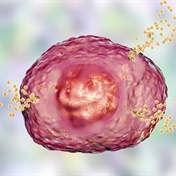- Severe Covid-19 largely affects the elderly and those with underlying conditions
- Deadly Covid-19 in healthy younger people could potentially be linked to a faulty autoimmune response or a genetic mutation
- This could influence the way we treat Covid-19
We now understand that there are risk factors that make some people more susceptible to severe Covid-19 than others. These include being elderly, obese and suffering from diabetes.
But what baffles many people, including experts, is the fact that a number of young and healthy people also suffer severe outcomes or die from Covid-19.
Now, new research from the Rockefeller University has shown that more than 10% of young and healthy people who develop severe Covid-19 have “misguided” antibodies that, instead of attacking only the virus, end up targeting the immune system – leading to severe symptoms.
Another 3.5% of young people with severe Covid-19 carry a specific genetic mutation that may explain their severe reaction.
A missing interferon
The new research, published in the journal Science, explains that in both groups of younger patients with severe Covid-19, there is a lack of type I interferon – a set of 17 proteins responsible for protecting the body against viruses.
There are two ways the lack of interferon may occur in these cases. In some cases, the proteins are neutralised by auto-antibodies, while in others, patients lack sufficient levels of interferons because of a faulty gene.
"These findings provide compelling evidence that the disruption of type I interferon is often the cause of life-threatening Covid-19," said Jean-Laurent Casanova, head of the St. Giles Laboratory of Human Genetics of Infectious Diseases at The Rockefeller University and a Howard Hughes Medical Institute investigator, in a press release. "And at least in theory, such interferon problems could be treated with existing medications and interventions.
"Covid-19 may now be the best understood acute infectious disease in terms of having a molecular and genetic explanation for nearly 15% of critical cases across diverse ancestries," Casanova stated.
Genetics and their impact on Covid-19
Initially, the different effects that Covid-19 had on different people was a complete mystery – with some patients suffering only mild effects and others dying within days.
Casanova's research over the last two decades has shown that in cases where people are unusually susceptible to an infection, it can be traced to single-gene mutations that affect their immune response.
More recently, Casanova and the team analysed blood samples from hospitalised Covid-19 patients, as well as from milder cases to see whether there is a difference between 13 genes known to be critical for fighting influenza. These genes are also known to govern type 1 interferons.
From this study, they found that a significant number of people with severe Covid-19 have rare variants in these 13 genes, with more than 3% of them actually missing one of the genes.
Their immune cells also didn’t seem to produce any type I interferons, which form the first line of defence against viruses.
Autoimmune condition as a culprit
The researchers also wanted to check whether auto-antibodies, which are known to neutralise the type I interferon, could be causing mutations, leading to more severe infections.
When the researchers investigated severe Covid-19 cases, they found that more than 10% of 987 patients had these auto-antibodies, which rendered the interferons useless against SARS-Cov-2 infections. This occurred mostly in men.
According to the researchers, these auto-antibodies are quite rare, with only four out of 1 277 healthy people having them.
"All of these findings strongly indicate that these auto-antibodies are actually the underlying reason some people get very sick, and not the consequence of the infection," Casanova said.
These findings could lead to more specific medical treatments, as interferons are already available as medication, used to treat conditions such as chronic viral hepatitis.
READ| What experts have learned, and the questions that remain about severe Covid-19 infections
READ| How Covid-19 took hold in South Africa
Image credit: iStock




 Publications
Publications
 Partners
Partners















